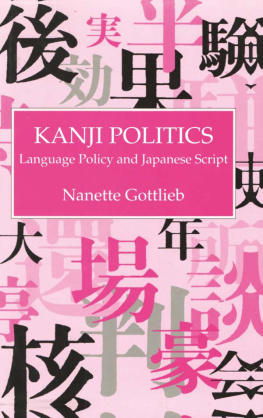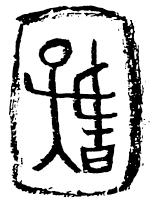KANJI POLITICS
Language Policy
and Japanese Script
Japanese Studies
General Editor: Yoshio Sugimoto
Images of Japanese Society: Ross E. Mouer and Yoshio Sugimoto
An Intellectual History of Wartime Japan: Shunsuke Tsurumi
A Cultural History of Postwar Japan: Shunsuke Tsurumi
Beyond Computopia: Tessa Morris-Suzuki
Constructs for Understanding Japan: Yoshio Sugimoto and Ross E. Mouer
Japanese Models for Conflict Resolutions: S. N Eisenstadt and Eyal Ben-Ari
Changing Japanese Suburbia: Eyal Ben-Ari
The Rise of the Japanese Corporate System: Koji Matsumoto
Science, Technology and Society in Postwar Japan: Shigeru Nakayama
Group Psychology of the Japanese in Wartime: Toshio Iritani
Enterprise Unionism in Japan: Hirosuke Kawanishi
Social Psychology of Modern Japan: Munesuke Mita
The Origin of Ethnography: Minoru Kawada
Social Stratification in Contemporary Japan: Kenji Kosaka
Sociology and Society of Japan: Nozomu Kawamura
Diversity in Japanese Culture and Language: edited by John C. Maker and Gaynor Macdonald
Migrant Workers in Japan: Hiroshi Komai
Difference and Modernity: Social Theory and Contemporary Japanese Society: John Clammer
Japanese Encounters with Postmodernity: Johann Arnason and Yoshio Sugimoto
Kanji Politics: Nanette Gottlieb
First published in 1995 by
Kegan Paul International Limited
Published 2016 by Routledge
2 Park Square, Milton Park, Abingdon, Oxon OX14 4RN
711 Third Avenue, New York, NY 10017, USA
Routledge is an imprint of the Taylor & Francis Group, an informa business
Distributed by
Columbia University Press
562 West 113th Street
New York, NY 10025, USA
Tel: (212) 666 1000 Fax: (212) 316 3100
Copyright Nanette Gottlieb 1995
The publishers gratefully acknowledge the assistance of the Japan Foundation in the publication of this volume.
Phototypeset in 10 on 12 pt Times
by Intype, London
All rights reserved. No part of this book may be reprinted or reproduced or utilized in any form or by any electronic, mechanical or other means, now known or hereafter invented, including photocopying and recording, or in any information storage or retrieval system, without permission in writing from thepublishers.
British Library Cataloguing in Publication Data
Gottlieb, Nanette
Kanji Politics: Language Policy and Japanese Script - (Japanese Studies)
I. Title II. Series
306.44952
ISBN 0-7103-0512-5
US Library of Congress Cataloging in Publication Data
Gottlieb, Nanette, 1948
Kanji politics : language policy and Japanese script / Nanette Gottlieb.
245pp. 22 cm.(Japanese studies)
Includes bibliographical references and index.
ISBN 0-7103-0512-5
1. Japanese languagePolitical aspects. 2. Language policyJapan. 3. Chinese charactersJapan. I. Title. II. Series. BL524.73.G68 1995
ISBN 13: 978-0-7103-0512-1 (hbk)
Contents
The nature of the Japanese script has been a matter of contention since the early Meiji period. It was not until 1902, however, that the government was persuaded by lobbyists from pressure groups convinced of the need to simplify the written language to establish an official body which would investigate and oversee language issues. That first body, the National Language Research Council, has since been succeeded by two others, of which the second, the National Language Council, remains the governments language policy organ today. The modernised system of kana usage and the guidelines on the use, shape and readings of characters which are in place today are the result of eighty years of often vitriolic controversy over the relative merits of tradition and convenience in the area of script. The prewar orthography, when no official policies relating to the number of characters to be used and taught prevailed and the kana system was still that based on mediaeval pronunciation, was held by its supporters to be an important repository of traditional cultural and spiritual values. To those who wished to reform it, however, it represented a remnant of feudal days and a major hindrance to effective education because of the time required to master it. The tension between these two opposing viewpoints and the evolving changes in the influence of those holding them has meant that the development and implementation of policies relating to the written language has been marked by alternating periods of progress towards the desired reforms and subsequent regression, depending on who was in power at the time.
Those wishing to reform the orthography were of one of two persuasions: they were either moderates who wanted to limit the number of Chinese characters in use or radicals who dreamed of replacing them altogether by one of Japans two phonetic scripts or by the Western alphabet. Attempts to advance their cause during the first half of this century were frustrated by entrenched conservative values, by the 1923 earthquake and by war. It was not until 1945 and the end of the war that the liberalising influence of the Occupation allowed them to push for and achieve script reform as a means of expediting the econstruction of the nation and helping to spread the concept of democracy. Considerable change was made in the following fifteen years with a list of reforms which touched on all aspects of script use. With the reestablishment of economic prosperity, however, there began a period of introspection during which longtime conservative opponents of these reforms successfully engineered an official reexamination of the policies by the National Language Council, a reexamination which was supported both by a special committee of the LDP convened to consider language issues and by private pressure groups of concerned individuals. The result of these manoeuvres has been the relaxation of earlier limits, a partial rescinding of some of the postwar policies, in a twenty-five year process of reflection and revision which ended in 1991.
This book examines the history of the policy process as it relates to script from the establishment of the inaugural National Language Research Council in 1902 to the completion of the review cycle in 1991. There have of course been policies relating to the spoken language during that time, particularly with regard to standardisation and the use of honorifics, but they do not form part of the present study. Nor do policies relating to the minority languages of Japan. The focus is on the written language, specifically the script system. How has language policy worked in the Japanese context? Why were policies necessary in the first place? Who has been responsible for formulating and implementing policy in this area? Whose interests have been served? What motives have driven the process? What has been its focus? What have been the major arguments for and against it? What bodies have been set up to oversee it? How have their policies been received by educators, the press and society at large? Has the whole process been conducted smoothly, or has it been a rocky road, and if so, why? Where has most opposition come from? To what extent has government overtly directed policy formulation? These questions and others are addressed in this book, which is the outcome of a two-year research grant from the Australian Research Council and has involved interviews with many of the key players in the postwar period as well as research on the vast amount of primary source material on the topic.
Next page





